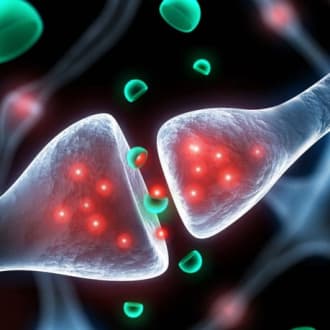The Best of PsyPost.org
10+ most popular PsyPost.org articles, as voted by our community.
PsyPost.org on Anxiety
Benevolent creativity might help protect against the anxiety aroused by contemplating death
Certain types of creative activity can help buffer against feelings of anxiety evoked by thinking about death, particularly among those who are searching for meaning in life, according to new research…
PsyPost.org on Mental Health
People with heightened anxiety have altered perceptions of their breathing, study finds
New research provides evidence that anxiety is related to altered interoception, the perception of one's own internal bodily states. The new study, published in the journal Neuron, examined the…
Self-help resources can encourage victim-blaming of individuals with depression, study finds
Reading non-evidence-based self-help statements encourages victim-blaming toward people with depression, according to a series of studies published in the Journal of Positive Psychology. The…
«Reading non-evidence-based self-help statements encourages victim-blaming toward people with depression, according to a series of studies published in the Journal of Positive Psychology.»
PsyPost.org on Narcissism
Narcissistic tendencies moderate the association between testosterone levels and generosity in men
New research provides evidence that narcissism moderates the relationship between testosterone and generosity in men. The study, published in Hormones and Behavior, found that the most generous men…
«endogenous testosterone was associated with lower generosity among less narcissistic — thus more trustful, less cynical, more habitually generous, and less selfish — men,” Ziemiańska explained.»
PsyPost.org on Parenting
Longitudinal study suggests Disney princess culture has a positive impact on young children's gender development
Children who engage the most with princess culture report more egalitarian attitudes about gender roles, lower adherence to hyper-masculine norms, and better body esteem five years later. This finding…
Brain imaging study finds parental criticism disrupts children's adaptive responses to rewards and losses
According to a neuroimaging study published in the Journal of Experimental Child Psychology, children whose mothers are more critical toward them show reduced brain activity in response to monetary…
«If replicated and extended in longitudinal research, this disruption in adaptive responses to environmental experiences during childhood may be one mechanism for the development of negative outcomes that surge during adolescence such as depression»
PsyPost.org on Psychedelics
Emotional breakthroughs during psychedelic experiences linked to future increases in mental well-being
New research highlights the importance of emotional breakthroughs on subsequent psychological outcomes after a psychedelic experience. The study, which ...
Study provides evidence that DMT is produced naturally from neurons in the mammalian brain
New research published in Scientific Reports indicates that the rat brain is capable of synthesizing and releasing a powerful psychedelic drug called ...
PsyPost.org on Psychology
Does materialism really lead to lower life satisfaction? Surprising new study suggests otherwise
New research casts doubt on the belief that heightened materialism leads to reduced life satisfaction. The results of the study suggest that the negative association between materialism and life…
«“Even though we did not find that materialism leads to reduced life satisfaction, we did find that people who experienced lower life satisfaction increased in their belief that having more possessions would make them happier,” Jaspers explained. “This belief represents one of three facets of materialism as it is commonly defined and measured in materialism research.”»
Eye-tracking study suggests that people with social anxiety not only avoid looking at strangers but also their…
A new study published in the journal PLOS One suggests that social anxiety is characterized by increased avoidance, rather than hypervigilance, during social situations. ...
«People with social anxiety disorder (SAD) experience a persistent fear of social judgment, leading them to avoid social scenarios.»
PsyPost.org on Relationships
Trying to make other people happy makes us happier than trying to make ourselves happy
The secret to happiness may lie in doing things to make other people happy, rather than ourselves, according to a series of five studies published in the Journal of Positive Psychology. The findings…
«feeling a greater connection to others explained why doing something for another person tended to leave participants happier than doing something for themselve»
Wellbeing and social connection can generate "an upward spiral" by reinforcing one another
Social connection and agency are known to be positively correlated with emotional well-being, but does one lead to another or are they independent but related? A study published in The Journal of…
«“Collectively these findings suggest that having a sense of control over one’s life and having high levels of emotional well-being are important for building social connections and can indeed predict levels of social connection up to 13 years later,”»
PsyPost.org on Well Being
Well-being and cognitive ability are linked throughout childhood, study finds
A longitudinal study has found evidence that well-being and cognition mutually affect each other throughout childhood and early adolescence. The study, published in the journal Clinical Psychological…
Popular
These are some all-time favorites with Refind users.
Mindfulness meditation can increase selfishness and reduce generosity among those with independent self-construals
When Japanese chef Yoshihiro Murata travels, he brings water with him from Japan. He says this is the only way to make truly authentic dashi, the ...
«Taking something out of its geographic or cultural context often changes the thing itself.»
Brain imaging study suggests that drinking coffee enhances neurocognitive function
Plenty of people claim they can’t function without their morning coffee, but is there a neurological basis to it? A study published in Scientific Reports suggests that coffee does have beneficial…
«caffeine can increase attention, working memory, and cognition.»
Attractiveness is associated with the belief that economic success is dependent on individual effort, rather than external…
According to a recent study published in Economics and Human Biology, beauty is associated with lower support for redistribution. Attractive individuals are more likely to attribute economic success…
New psychology study provides insight into fundamental cognitive processes linked to dogmatism
Dogmatic individuals tend to form less accurate judgements thanks to a generic resistance to seeking out additional information, according to new research ...
Synthesis of over 50 meta-analyses examines link between Big Five personality and performance
A synthesis of 54 meta-analyses which collectively included over 2000 studies and 550,000 participants found a robust association between Big Five personality and performance. This research was…
What is Refind?
Every day Refind picks the most relevant links from around the web for you. is one of more than 10k sources we monitor.
How does Refind curate?
It’s a mix of human and algorithmic curation, following a number of steps:
- We monitor 10k+ sources and 1k+ thought leaders on hundreds of topics—publications, blogs, news sites, newsletters, Substack, Medium, Twitter, etc.
- In addition, our users save links from around the web using our Save buttons and our extensions.
- Our algorithm processes 100k+ new links every day and uses external signals to find the most relevant ones, focusing on timeless pieces.
- Our community of active users gets the most relevant links every day, tailored to their interests. They provide feedback via implicit and explicit signals: open, read, listen, share, mark as read, read later, «More/less like this», etc.
- Our algorithm uses these internal signals to refine the selection.
- In addition, we have expert curators who manually curate niche topics.
The result: lists of the best and most useful articles on hundreds of topics.
How does Refind detect «timeless» pieces?
We focus on pieces with long shelf-lives—not news. We determine «timelessness» via a number of metrics, for example, the consumption pattern of links over time.
How many sources does Refind monitor?
We monitor 10k+ content sources on hundreds of topics—publications, blogs, news sites, newsletters, Substack, Medium, Twitter, etc.
Can I submit a link?
Indirectly, by using Refind and saving links from outside (e.g., via our extensions).
How can I report a problem?
When you’re logged-in, you can flag any link via the «More» (...) menu. You can also report problems via email to hello@refind.com
Who uses Refind?
450k+ smart people start their day with Refind. To learn something new. To get inspired. To move forward. Our apps have a 4.9/5 rating.
Is Refind free?
Yes, it’s free!
How can I sign up?
Head over to our homepage and sign up by email or with your Twitter or Google account.

















